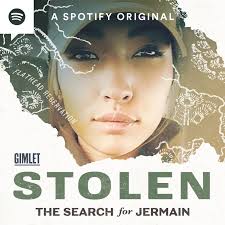Stolen Podcast Exposes Human Rights Crisis As Interior Secretary Haaland Announces Action To Investigate
In today's world, disinformation seems to attract more believers than factual information. The media once served to hold accountable elected officials, big business, and the government bureaucracy. Now, the media is verbally assaulted as "fake" and unfair.
Since podcasting has grown as a media format that has attracted more ears, podcasts have often served as a public good to highlight societal problems that have been neglected or mishandled.
That's why the recent announcement by U.S. Interior Secretary Deb Haaland about the creation of an investigative unit to probe cases of missing and murdered Native Americans felt like a major win for the Gimlet / Spotify podcast
“Stolen: The Search for Jermain."
Haaland said in her confirmation hearings earlier this year that the issue of missing and murdered indigenous women would be a major priority for her at Interior.
“Whether it’s a missing family member or a homicide investigation, these efforts will be all hands-on deck,” Haaland added during her announcement. “We are fully committed to assisting Tribal communities with these investigations, and the MMU will leverage every resource available to be a force-multiplier in preventing these cases from becoming cold case investigations.”
The announcement comes as Indigenous people have expressed hope that Haaland at the helm of the department will mean increased attention on issues specifically affecting the community. Both Haaland and supporters in Congress have emphasized the value placed on environmental stewardship and conservation in Native communities.
The true-crime podcast from Gimlet/Spotify premiered on March 1 and uncovers the missing and murdered Indigenous women (MMIW) human-rights crisis disproportionately affects Indigenous peoples in Canada and the United States, notably those in the FNIM (First Nations, Inuit, Métis) and Native American communities.
According to U.S. crime statistics, Native American women are more than twice as likely to experience violence than any other demographic. One in three Native women is sexually assaulted during her life, and 67 percent of these assaults are perpetrated by non-Natives.
Currently, the federal laws surrounding violent crimes create difficulties in dealing with non-Native perpetrators on native lands.
"When media like this podcast expose a social and criminal injustice," begins podcast consultant George Witt, "we find that government officials pay attention and use that added visibility to right the wrong."
Podcast host Connie Walker, who is Cree from Okanese First Nation in Canada, has made it her life’s work as a journalist to tell the stories of missing and murdered Indigenous women. “Stolen: The Search for Jermain,” marks not only her first story with Gimlet Media but also the first U.S. case of a missing Indigenous woman that she’s investigated.
The podcast, “Stolen: The Search for Jermain,” is the first release since her acclaimed series “Missing and Murdered.”
“Stolen: The Search for Jermain” specifically focuses on the case of a missing Indigenous woman, Jermain Charlo, in Montana, who was out one evening at a bar in Missoula and never made it home. Over the course of eight episodes, Walker is on the ground in real time tracking down leads through the dense mountains of the Flathead Reservation, all while examining what it means to be an Indigenous woman in America, as Jermain was.
Stories of missing and murdered Indigenous women in the U.S. have long gone uncovered by mainstream media, and Walker hopes to change that. For added perspective, the statistics on violence against Indigenous women in the U.S. are alarming — according to the Indian Law Resource Center:
Native American women in particular are the victims of murder at over 10 times the national average, according to the Coalition to Stop Violence Against Native Women. Homicides are the No. 3 cause of death for American Indian and Alaska Native girls and women ages 10 to 24, according to the Centers for Disease Control and Prevention.
The federal government formed a task force on the issue in 2019 to pursue such cases. Haaland said the new unit will expand on that work and establish a unit chief position to develop policy for the unit. The unit will review unsolved cases and work with tribal, BIA and FBI investigators on active cases as well, according to the department.
“Violence against Indigenous peoples is a crisis that has been underfunded for decades. Far too often, murders and missing persons cases in Indian country go unsolved and unaddressed, leaving families and communities devastated,” Haaland said in a statement. “The new unit will provide the resources and leadership to prioritize these cases and coordinate resources to hold people accountable, keep our communities safe, and provide closure for families.”

Comments
Post a Comment
Thank You for your input and feedback. If you requested a response, we will do so as soon as possible.